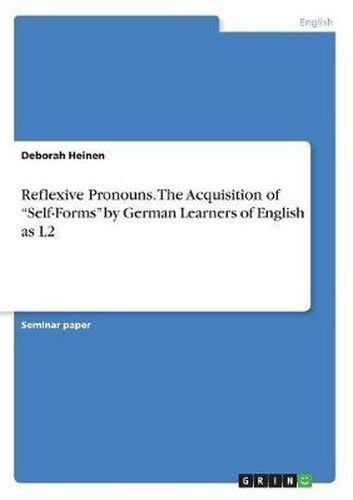Readings Newsletter
Become a Readings Member to make your shopping experience even easier.
Sign in or sign up for free!
You’re not far away from qualifying for FREE standard shipping within Australia
You’ve qualified for FREE standard shipping within Australia
The cart is loading…






Seminar paper from the year 2016 in the subject English Language and Literature Studies - Linguistics, grade: 1,0, University of Bonn, language: English, abstract: Prior linguistic knowledge - it seems plausible that the acquisition of a second language can be influenced by the learner’s knowledge of structures and rules of his or her first language . Especially similarities between languages are probably tending to either facilitate the learning process or to impede it (cf. Gundel & Tarone 1994: 87). This cross-linguistic influence is called language transfer, which can be described as negative when the application of L1 structures or rules on a L2 utterance leads to a linguistically incorrect expression (cf. Saville-Troike 2012: 19). Given the fact that similarities between languages might impede the learning process of the L2, the work in hand takes a closer look at reflexive pronouns in English and German. As self-forms in English and sich-forms in German look quite similar but differ in their use, they appear as a possible source of error for German learners of English. Therefore, the leading question of the paper is whether L2 English learners recognize the differences in the use of self-forms in English and the use of sich in German. The hypothesis is that, based on their L1 knowledge, German learners of English are likely to make use of reflexive pronouns more often than necessary. In other words, it is assumed that a negative language transfer is likely to occur due to the formal similarities between the L1 and L2. Further information on the theoretical basis of the study will be given in the second chapter, followed by the part on methodology that includes information on the informants, the research instruments, and the data collection procedure. In the following two chapters, the results of the study will be presented and, with regard to possible explanations and limitations, discussed. Finally, the main findings of the paper will be summarized
$9.00 standard shipping within Australia
FREE standard shipping within Australia for orders over $100.00
Express & International shipping calculated at checkout
Seminar paper from the year 2016 in the subject English Language and Literature Studies - Linguistics, grade: 1,0, University of Bonn, language: English, abstract: Prior linguistic knowledge - it seems plausible that the acquisition of a second language can be influenced by the learner’s knowledge of structures and rules of his or her first language . Especially similarities between languages are probably tending to either facilitate the learning process or to impede it (cf. Gundel & Tarone 1994: 87). This cross-linguistic influence is called language transfer, which can be described as negative when the application of L1 structures or rules on a L2 utterance leads to a linguistically incorrect expression (cf. Saville-Troike 2012: 19). Given the fact that similarities between languages might impede the learning process of the L2, the work in hand takes a closer look at reflexive pronouns in English and German. As self-forms in English and sich-forms in German look quite similar but differ in their use, they appear as a possible source of error for German learners of English. Therefore, the leading question of the paper is whether L2 English learners recognize the differences in the use of self-forms in English and the use of sich in German. The hypothesis is that, based on their L1 knowledge, German learners of English are likely to make use of reflexive pronouns more often than necessary. In other words, it is assumed that a negative language transfer is likely to occur due to the formal similarities between the L1 and L2. Further information on the theoretical basis of the study will be given in the second chapter, followed by the part on methodology that includes information on the informants, the research instruments, and the data collection procedure. In the following two chapters, the results of the study will be presented and, with regard to possible explanations and limitations, discussed. Finally, the main findings of the paper will be summarized